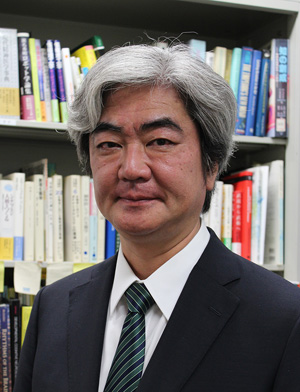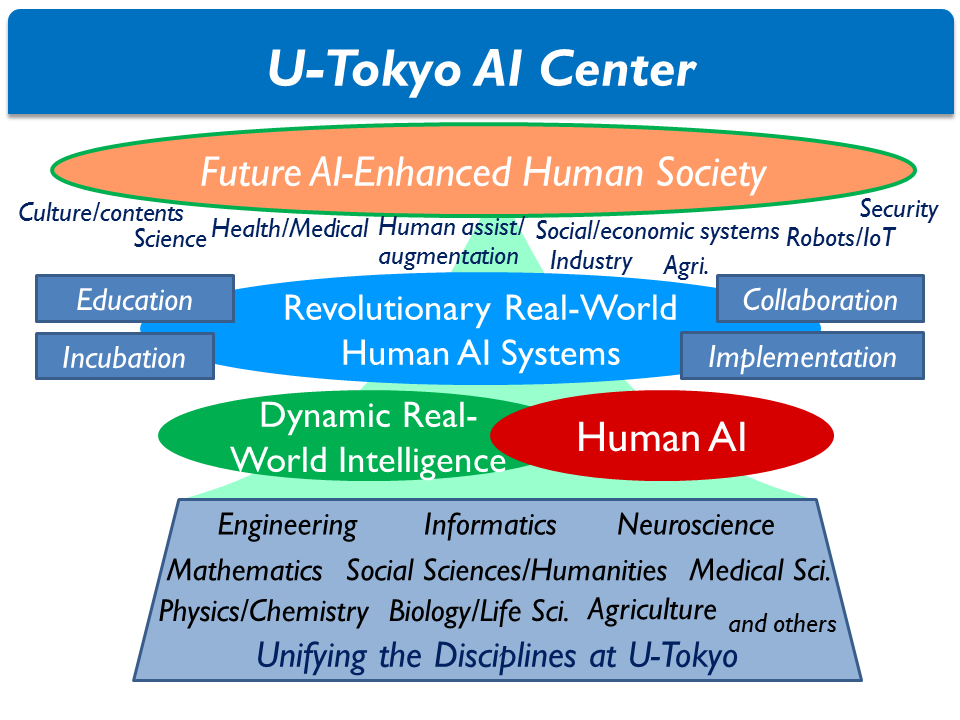About
Message from the Center’s Director

KUNIYOSHI Yasuo
Director of Next Generation Artificial Intelligence Research Center
The University of Tokyo
Our center goes beyond existing frameworks for artificial intelligence to create and implement new technology systems in the field of intelligence science that are truly helpful to humanity and that will serve as the driving force of the society of the future.
Our research focuses on “dynamic real-world intelligence” and “human artificial intelligence.”
The word “dynamic” in the former phrase refers to constant change. In order to act intelligently in the dynamic real world we inhabit, which is unpredictable and different from the limited worlds found in applications such as playing the game Go or handling objects in a warehouse, artificial intelligence requires the application of the principles of biological intelligence, which is capable of flexibly responding to changes in the real world. In order to do this, it is necessary to work on projects that synthesize the creation, application, and development of behavior and cognition based on physicality; next-generation neuromorphic computing that performs dynamic information processing; expository research on biological intelligence including neuroscience, behavioral science, and psychology; and revolutionary materials, devices, and mechanisms for biological robots and IoT.
The latter phrase, “human artificial intelligence,” refers to the application of an understanding of humans’ minds, value systems, and morals to support humans and to make decisions that humans agree with to solve real-world problems for which there are no right answers. Human artificial intelligence is made possible through the cooperation of a wide variety of fields involved in a multi-faceted research approach to subjects related to humans including cognitive science, neuroscience, brain-like information processing, emotion recognition and understanding, and human interfaces, in addition to sociology, economics, law, politics, and philosophy.
In addition, since the application of artificial intelligence will potentially bring about large changes in society, this research center also explores answers to questions such as what kind of a society should humanity aim for, and what new technologies and new social systems will become necessary to achieve this. Instead of becoming preoccupied with frameworks for the future, it is necessary to discuss, investigate, and work on the ideal situation. In order to achieve this, close collaboration with researchers in the humanities and social sciences is indispensable.
This center strives to contribute to the progress of society by sharing the results of our research and implementing them, and using the feedback that is received to make further advances in basic research. In order to accomplish this, this center works on projects in collaboration with industry and other partners.

Director’s Biography:
KUNIYOSHI Yasuo
Director of Next Generation Artificial Intelligence Research Center of The University of Tokyo and Professor, Graduate School of Information Science and Technology, The University of Tokyo.
KUNIYOSHI Yasuo received Ph.D. from The University of Tokyo in 1991 and joined Electrotechnical Laboratory, AIST, MITI, Japan. From 1996 to 1997 he was a Visiting Scholar at MIT AI Lab. In 2001 he was appointed as an Associate Professor and then full Professor in 2005 at The University of Tokyo.He is also the Director of RIKEN BSI-Toyota Collaboration Center since 2012, and the Director of Next Generation Artificial Intelligence Research Center of The University of Tokyo since 2016.
His research interests include emergence and development of embodied cognition, humanoid and bio-inspired robotics, and human AI. He published over 500 technical papers and authored or edited more than 22 books. He received IJCAI 93 Outstanding Paper Award, Okawa Publications Prize, Gold Medal “Tokyo Techno-Forum21” Award, IEEE International Conference on Robotics and Biomimetics T.-J. Tarn Best Paper Award in Robotics, RSJ Best Paper Awards, and other awards.He is a Fellow of Robotics Society of Japan and a member of IEEE, Science Council of Japan (affiliate), Japan Society of Artificial Intelligence, Information Processing Society of Japan and the Japanese Society of Baby Science.
Overview of Next Generation Artificial Intelligence Research Center (AI Center)
Next Generation Artificial Intelligence Research Center (AI Center) attempts to transcend the framework and limitations of current AI technology to construct a novel scheme of science and technology regarding human and artificial intelligence. It will be truly beneficial for humans, driving future society, industry, economy, culture and research. Based on the new scheme, the AI Center will also propose and realize a vision/design of the future society and contribute to advanced education of next leaders. In order to realize these, the AI Center is established as an inter-school research organization to unite all relevant disciplines of the University of Tokyo from science and technology to the humanities as well as external collaborations for powerful syntheses.
Purposes of AI Center
1. Promotion of Next-Generation Artificial Intelligence Studies
To contribute to the development of pioneering research conducted at this university while integrating related advanced theories, create systems for next-generation artificial intelligence studies, and promote research in the field, this center focuses on the planning and promotion of next-generation artificial intelligence integrated research. It also plans to establish a Next-Generation Artificial Intelligence Studies Alliance whose members include researchers from this center and researchers from within the university, outside of the university, and overseas in related fields beyond humanities and social sciences, comprehensive joint research with industry, and creation of startups.
2. Proposal of a Future Vision for an Intelligent Society
This center works on investigating and proposing new ideas related to the various social changes and social problems that arise in conjunction with the development and adoption of artificial intelligence technology. It focuses on creating a specific vision for the ideal version of society, economy, culture, and academia in the future amidst the new possibilities created by next-generation artificial intelligence. Additionally, it also aims to identify topics for research that are needed to achieve these goals and leading society through obtaining feedback in response to external presentations and providing suggestions for government policies.
3. Human Resource Development
To nurture adults who will lead society amidst the rapid changes that are taking place owing to the spread of artificial intelligence and researchers who promote education and research in next-generation artificial intelligence, this center has constructed and implemented a cutting-edge integrated education system and provides economic support for students. In addition, this center grants appointments to outstanding researchers and members of society with an emphasis on appointing those from the younger generation, and nurtures them through participation in the research and education activities described above.
Research Departments
Department of Machine Intelligence
The Department of Machine Intelligence promotes and enhances research on leading-edge theories, methods and implementation of machine learning/recognition/decision-making/generation from/of data. It pioneers a range of applications working collaboratively with different fields, industries, and universities while also developing human resources.
Department of Dynamic Real-World Intelligence
The Department of Dynamic Real-World Intelligence works to realize intelligent systems that combine openness and adaptability with stability and reliability that can always operate intelligently and appropriately in the real world. In contrast with limited worlds such as Go boards and warehouse goods management, our target domain is marked by unpredictability. The department deals with areas such as robots, IoT, transportation, cities, infrastructure, and economic and social systems, as well as elemental technologies such as biological intelligence, next-generation computing, and revolutionary materials, devices, and mechanisms.
Department of Human AI
The Department of Human AI aims to realize revolutionary intelligent systems based on scientific knowledge of the human brain and mind. It also aims at creating AI systems that can understand the human mind, values, and ethics to support humans and make decisions on complex real-world problems in such ways that humans can agree/accept. In other words, the department works for the creation of Beneficial AI that serves human beings/society. The department also collaborates with humanity and social sciences to re-examine the nature of humanity in addition to cognitive science, neuroscience, brain-like information processing, emotional recognition and understanding, and human interfaces.
Department of Intelligent Society
How will our society change by exploiting and the impact of AI? What kind of future society should we be aiming for? Are human beings also going to change? How should AI be used and what kinds of new technologies and social systems are required for this purpose? How should AI technology itself develop? The Department of Intelligent Society takes initiatives in the collaborative investigation and discussions of the future vision beyond existing framework, shared with the society, and realized in collaboration with the stake holders. Collaboration across fields including AI, various relevant technologies/applications and humanities and social sciences is inevitable.
Intelligent Mobility Society Design, Social Cooperation Program
We aim at establishing the core technology for the next generation artificial intelligence capable of understanding mobility society’s value system and human emotions, and thereby training talented scientists/engineers for the next generation.
Furthermore, looking towards Society 5.0, we work on constructing AI systems that design infrastructures and cities for a sustainable mobility society, and on creation of ambient living/mobility space for improving people’s well-being, as well as realizing them in our society.

